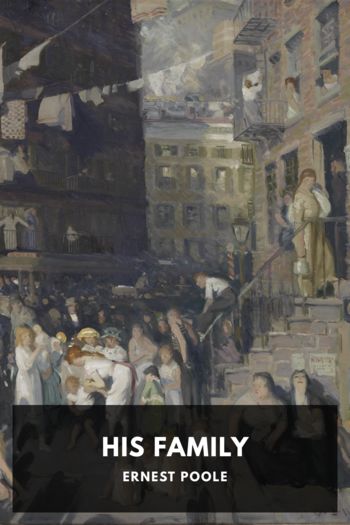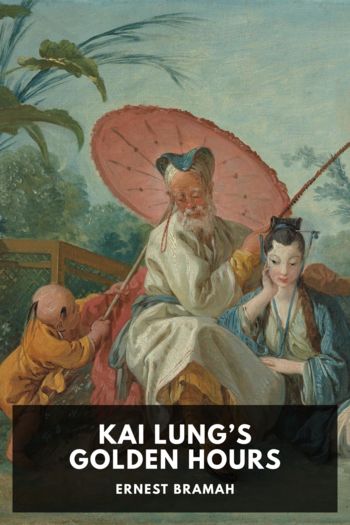His Family - Ernest Poole (ereader for comics .txt) 📗

- Author: Ernest Poole
Book online «His Family - Ernest Poole (ereader for comics .txt) 📗». Author Ernest Poole
Before that, Judith his wife had been here. It was then that the city had been young, for to Roger it had always seemed as though he were just beginning life. Into its joys and sorrows too he had groped his way as most of us do, and had never penetrated deep. But he had meant to, later on. When in his busy city days distractions had arisen, always he had promised himself that sooner or later he would return to this interest or passion, for the world still lay before him with its enthralling interests, its beauties and its pleasures, its tasks and all its puzzles, intricate and baffling, all some day to be explored.
This deep zest in Roger Gale had been bred in his boyhood on a farm up in the New Hampshire mountains. There his family had lived for many generations. And from the old house, the huge shadowy barn and the crude little sawmill down the road; from animals, grown people and still more from other boys, from the meadows and the mountain above with its cliffs and caves and forests of pine, young Roger had discovered, even in those early years, that life was fresh, abundant, new, with countless glad beginnings.
At seventeen he had come to New York. There had followed hard struggles in lean years, but his rugged health had buoyed him up. And there had been genial friendships and dreams and explorations, a search for romance, the strange glory of love, a few furtive ventures that left him dismayed. But though love had seemed sordid at such times it had brought him crude exultations. And if his existence had grown more obscure, it had been somber only in patches, the main picture dazzling still. And still he had been just making starts.
He had ventured into the business world, clerking now at this, now at that, and always looking about him for some big opportunity. It had come and he had seized it, despite the warnings of his friends. What a wild adventure it had been a bureau of news clippings, a business new and unheard of but he had been sure that here was growth, he had worked at it day and night, and the business widening fast had revealed long ramifications which went winding and stretching away into every phase of American life. And this life was like a forest, boundless and impenetrable, up-springing, intertwining. How much could he ever know of it all?
Then had come his marriage. Judith’s family had lived long in New York, but some had died and others had scattered until only she was left. This house had been hers, but she had been poor, so she had leased it to some friends. It was through them he had met her here, and within a few weeks he had fallen in love. He had felt profound disgust for the few wild oats he had sown, and in his swift reaction he had overworshipped the girl, her beauty and her purity, until in a delicate way of her own she had hinted that he was going too far, that she, too, was human and a passionate lover of living, in spite of her low quiet voice and her demure and sober eyes.
And what beginnings for Roger now, what a piling up of intimate joys, surprises, shocks of happiness. There had come disappointments, too, sudden severe little checks from his wife which had brought him occasional questionings. This love had not been quite all he had dreamed, this woman not so ardent. He had glimpsed couples here and there that set him to imagining more consuming passions. Here again he had not explored very deep. But he had dismissed regrets like these with only a slight reluctance. For if they had settled down a bit with the coming of their children, their love had grown rich in sympathies and silent understandings, in humorous enjoyment of their funny little daughters’ chattering like magpies in the genial old house. And they had looked happily far ahead. What a woman she had been for plans. It had not been all smooth sailing. There had come reverses in business, and at home one baby, a boy, had died. But on they had gone and the years had swept by until he had reached his forties. Absorbed in his growing business and in his thriving family, it had seemed to Roger still as though he were just starting out.
But one day, quite suddenly, the house had become a strange place to him with a strange remote figure in it, his wife. For he had learned that she must die. There had followed terrible weeks. Then Judith had faced their disaster. Little by little she had won back the old intimacy with her husband; and through the slow but inexorable progress of her ailment, again they had come together in long talks and plans for their children. At this same chessboard, in this room, repeatedly she would stop the game and smiling she would look into the future. At one such time she had said to him,
“I wonder if it won’t be the same with the children as it has been with us. No matter how long each one of them lives, won’t their lives feel to them unfinished like ours, only just beginning? I wonder how far they will go. And then their children will grow up and it will be the same with them. Unfinished lives. Oh, dearie, what children all of us are.”
He had put his arm around her then and had held her very tight. And feeling the violent trembling of her husband’s fierce revolt, slowly bending back her head and looking up into his eyes she had continued steadily:
“And when you come after me, my dear, oh, how hungry I shall be for all you will tell me. For you will live on in our children’s





Comments (0)